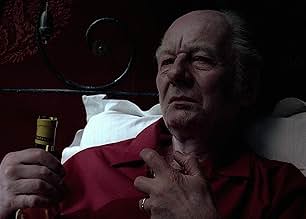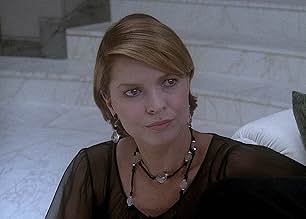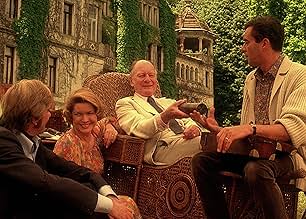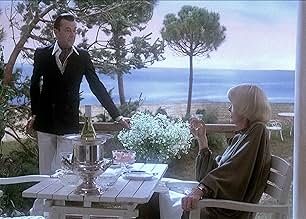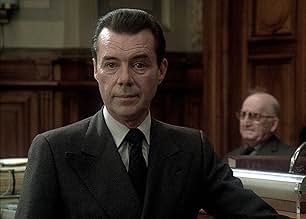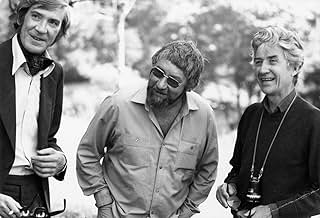VALUTAZIONE IMDb
7,4/10
3651
LA TUA VALUTAZIONE
Aggiungi una trama nella tua linguaA dying writer bases his last book on his own perception of his family.A dying writer bases his last book on his own perception of his family.A dying writer bases his last book on his own perception of his family.
- Regia
- Sceneggiatura
- Star
- Premi
- 11 vittorie e 2 candidature totali
Denis Lawson
- Dave Woodford
- (as Dennis Lawson)
Recensioni in evidenza
Not enough can truly be said for this film. Equally, nothing can change people's reaction to it; it is an art piece which separates people. Early reviews from the period of its release seem unfriendly at least. Many reviewers found the film pretentious and constructionally difficult. Many claimed it attempted more mystery than it had a right to. I feel this was a film ahead of its time, and any pomposity in the film comes not from its center, but from its central character, Clive Langham (John Gielgud). This, more than almost any film of the 20th century, is a film which rewards the viewer for multiple viewings. If you are often accused of being obsessive, overly-analytic or just plain artsy, this film will tickle you in some very personal places. The message I will refuse to comment on, though it is very deeply personal to me, and, I would say, to all writers. But the "crux of the biscuit," if you will, is this: examine the title in relation to the film.
10flasuss
In Providence, his only film in English Language, Resnais again approaches the most recurrent subject in his career: the memory. Here, he explores how one's feelings can affect it: the life of the writer reflects directly on his view of his son and the wife of this one, and their respective (supposed) lovers, which actually are a representation of the writer's alienation, guilt and self-depreciation. It shows how memory can be more painful than any pain of the flesh, and even worse than reality itself. Like everything i've seen from Resnais so far (Night and Fog, Hiroshima Mon Amour, Mon Oncle D'Amérique and one of my favorite films, Last Year in Marienbad), this one is a very deep and original masterpiece.
A dying artist, beautifully acted by Fainsilber, struggles to complete one last book before he dies - the plot of which becomes confused with his own troubled life as he thinks and dreams his way through the night. This was the first film in English for master film-maker Alain Resnais, and also happens to be one of his best. Using a variety of surreal cinematic techniques, Resnais is able to capture the characters of everyone in the film perfectly and his style - combined with excellent scripting - makes for an experience that will not be forgotten. Although the first half of the film will probably be spent in confusion, before you actually realise what is going on - I had to see this film several times before I was satisfied - it is worth struggling to understand this complex and thoroughly entertaining artistic movie.
I saw this film at release and have seen it several times since and this motion picture still holds up, a seemingly complex story that unravels steadily
throughout the film. Resnais uses every dramatic device available to tell what becomes a moving and tender portrait, not least visual puns, particularly a
sequence where Dirk Bogarde drives across "town", in which a very simple
montage predates digital morphing as seen in current commercials, smoothly
linked through the activity of the character. All good Resnais films include an examination of the minds of his characters and this is a superb twist-and-turn reality that involves us completely. The acting of course is flawless and includes a wonderful pairing of the great Elaine Stritch and Ellen Burstyn. David Warner, a personal favorite, is actually given the opportunity to act and steps up to the plate and compliments Dirk Bogarde's cool and wooden portrait. I regularly look for this release on DVD and am consistently disappointed. Could someone
publish it soon?
throughout the film. Resnais uses every dramatic device available to tell what becomes a moving and tender portrait, not least visual puns, particularly a
sequence where Dirk Bogarde drives across "town", in which a very simple
montage predates digital morphing as seen in current commercials, smoothly
linked through the activity of the character. All good Resnais films include an examination of the minds of his characters and this is a superb twist-and-turn reality that involves us completely. The acting of course is flawless and includes a wonderful pairing of the great Elaine Stritch and Ellen Burstyn. David Warner, a personal favorite, is actually given the opportunity to act and steps up to the plate and compliments Dirk Bogarde's cool and wooden portrait. I regularly look for this release on DVD and am consistently disappointed. Could someone
publish it soon?
Since so many good comments have been written here, mostly on the psychological side of the characters, and they are all excellent, I decided to comment upon a very present entity and that is WINE.
Notice that, until the last scene, everybody drinks white, mostly CHABLIS, an acid one. But on that last scene Resnais shifts to RED. It is no accident, it has in my modest opinion, a way that illustrates a very fundamental change in the feelings that occurred in that lunch.
Criticism and over-analysis, ever present till that event, give way to peaceful acceptance of the characters by the father, Without hypocrite sensibility, that he refuses, but with warmth and tolerance.
Well, I do believe, by some 55 years of experience, that white wine (dry, European style) makes one restless and sometimes bitter.
Red wine makes one more relaxed and happy.
I do not know which kind of wine Resnais prefers, but since he is a Breton I would not be surprised, that it is WHITE. Maybe that is the reason why His movies are so difficult to decode. They are also some of the most magnificent works of cinematic art..
Notice that, until the last scene, everybody drinks white, mostly CHABLIS, an acid one. But on that last scene Resnais shifts to RED. It is no accident, it has in my modest opinion, a way that illustrates a very fundamental change in the feelings that occurred in that lunch.
Criticism and over-analysis, ever present till that event, give way to peaceful acceptance of the characters by the father, Without hypocrite sensibility, that he refuses, but with warmth and tolerance.
Well, I do believe, by some 55 years of experience, that white wine (dry, European style) makes one restless and sometimes bitter.
Red wine makes one more relaxed and happy.
I do not know which kind of wine Resnais prefers, but since he is a Breton I would not be surprised, that it is WHITE. Maybe that is the reason why His movies are so difficult to decode. They are also some of the most magnificent works of cinematic art..
Lo sapevi?
- QuizSir John Gielgud, who spent most of his career on the stage, considered this movie and the television mini-series Ritorno a Brideshead (1981) to be his only two screen appearances of which he was genuinely proud.
- Citazioni
Clive Langham: Don't you think to have only one bastard after sixty years of action is almost tantamount to self denial?
- Curiosità sui creditiThe National Philharmonic Orchestra is misspelled as National Philarmonic Orchestra in the opening credits.
- ConnessioniFeatured in Zomergasten: Episodio #7.4 (1994)
I più visti
Accedi per valutare e creare un elenco di titoli salvati per ottenere consigli personalizzati
Dettagli
- Tempo di esecuzione1 ora 50 minuti
- Colore
- Proporzioni
- 1.78 : 1(original ratio)
Contribuisci a questa pagina
Suggerisci una modifica o aggiungi i contenuti mancanti

Divario superiore
By what name was Providence (1977) officially released in India in English?
Rispondi
